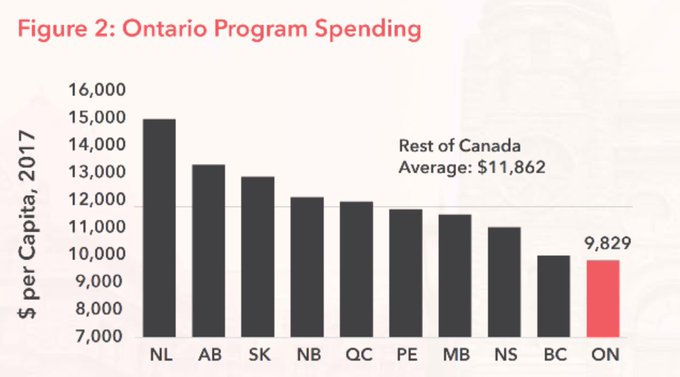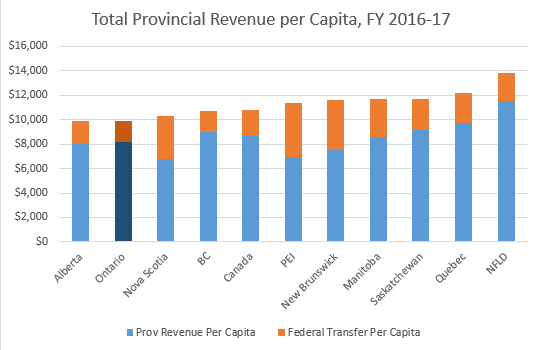Once a particular narrative takes hold in the public mind, no matter how divorced it is from reality, it can be extremely hard to dislodge.
By Ryan McGreal
Published May 30, 2019
Contemporary politics in Canada can be crazy-making. A simplistic lie, repeated often and shamelessly enough, starts to take on the air of truth. And once a particular narrative takes hold in the public mind, no matter how divorced it is from reality, it can be extremely hard to dislodge.
Case in point: per capita public revenue and spending in this province were the lowest in Canada during the previous Liberal government, while the per capita debt grew fairly modestly during a severe recession and actually declined for the last three years of that government.
This directly contradicts the prevailing narrative that public spending was "out of control" under the Liberals and that the debt has reached crisis levels. Ontario Premier Doug Ford recently went so far as to claim absurdly that the province is "bankrupt".
Disproving these strategic lies was not difficult. It's not like I had to tap into some esoteric knowledge available only to the elect. The country's finances are all public information, easy to download from the Statistics Canada and Department of Finance websites.
Unfortunately, stating an obvious truth in the face of a hurricane-force lie has little effect. It's almost impossible to be heard through the fervour of people whose hatred of the Liberals - and particularly former Premier Kathleen Wynne - was deep, visceral and vicious.
So I have to admit that it has been gratifying to hear a chorus of other voices starting to notice the objective facts in front of their noses, even if it took a year of repeated assaults on decency by the governing Progressive Conservative Party to shake people out of their complacency.
First of all, we have the Ontario Chamber of Commerce - hardly a bastion of radical left-wing zeal - with a new analysis of Ontario's deficit and debt that cannot help but notice the sky is not actually falling after all.
Here is their chart comparing Ontario's per capita program spending in 2017 to the rest of Canada:

Chart: Per Capita Program Spending by Province, 2017 (Image Credit: Ontario Chamber of Commerce)
The accompanying text notes:
Despite having a large debt, Ontario has exhibited strong fiscal prudence compared to other provinces. In 2017, Ontario only spent an average of $9,829 per capita on programs — the lowest in Canada (Figure 2). Further, spending on programs has grown at half the rate of the rest of Canada.
The analysis credits Ontario for doing a good job of controlling spending and reducing the deficit, and further notes that borrowing to invest in infrastructure and growth-supporting social programs is regarded as a good thing by credit rating agencies:
Ontario has done comparatively well to reduce expenditures and mitigate deficit spending costs. As discussed, spending cuts must be done with the full understanding of the economic consequences associated with the failure to either maintain and build critical infrastructure, or invest in social programs and growth-supporting services. It is also worth noting deficit spending that goes towards the development of government assets (such as infrastructure) is viewed by creditors more graciously as the cost of the debt is offset by an increase in total assets, thus mitigating the effect of these investments on net debt.
The Chamber also notes that with historically low interest rates - and no indication that they are going to rise significantly any time soon - it smacks of "opportunism" to pay down the debt when it makes more sense to take advantage of low rates for public investments that pay a bigger return than the reduced debt charge:
The normative effects of low interest rates present opportunities for public investments in projects with a rate of return on investment that exceeds the going interest rate. This leaves little impetus — outside of opportunism and insurance of a lower debt burden in the event of economic downturn — for governments to begin a regiment of debt repayment.
Now, this is still the Chamber of Commerce, an organization ideologically opposed to tax increases, so they are abstruse about the revenue side of the equation, falling back on generalities about taxes as market-distorting instruments best avoided where possible.
But the objective fact is that the Ontario government spends less because it collects less and hence has less to spend:

Chart: Provincial Revenue Per Capita, FY 2016-17
The Chamber may have been reluctant to draw a bright line from its own analysis to the obvious conclusion, but the editorial board of the Globe and Mail has no such qualms. In a blunt editorial published this week, the Globe notes:
Mr. Ford will frequently insist that his predecessors were responsible for “out-of-control” government spending – but among Canada’s provincial governments, Ontario is the lowest per capita spender. You read that right: Ontario is dead last in total spending – 10th out of 10.
The editorial goes on:
Conservatives also like to claim that taxes in Ontario are out of control, and a lot of voters surely feel that way. However, the unpleasant truth is that not only is Ontario Canada’s lowest-spending province – it also has a relatively low tax burden, and Confederation’s lowest per capita revenues.
Amazingly, the editorial from this venerable conservative daily concludes with rank conservative heresy:
Does the province need to balance its budget? No. It just needs to get the deficit down to a manageable level, low enough that the debt-to-GDP ratio gradually falls. That’s what was happening in the last few years of Liberal government, until the party opened the taps in an election year, and then the Tories brought in accounting changes that made things look even worse.
Incidentally, those "accounting changes" include taking Auditor-General Bonnie Lysyk's side in one of the odder policy debates in Ontario history.
In 2017, Auditor-General Lysyk abruptly changed how she evaluated the government's budget and decided that a public pension fund in surplus should count as a liability rather than an asset. The government argued that because the fund was in surplus, that represented money the government didn't need to feed into the pension fund, leaving it available for other uses.
The Ontario Government called together an expert panel led by Tricia O'Malley, the chair of the Canadian Actuarial Standards Oversight Council, to review the change and make a recommendation. The panel concluded that the government was following accounting best practices and that the AG was wrong.
That didn't stop Lysyk from continuing to insist against the conclusion of her own professional standards association that an asset should count as a liability. When the Ford government came in, they quickly accepted Lysyk's argument because it allowed them to pretend the deficit was far bigger than it actually was.
The incoming Ford government announced late last year that the deficit was actually $15 billion, rather than the $6.7 billion the previous Liberal government had stated. Of course, it soon came out that the government's chief accountant, Provincial Controller Cindy Veinot, actually took the extreme step of resigning rather than sign off on the bogus number.
But as this cynical age of neopopulism has taught us, a simplistic lie, repeated often and shamelessly enough, starts to take on the air of truth.
By grok (registered) | Posted July 08, 2019 at 09:47:06
"Once a particular narrative takes hold in the public mind, no matter how divorced it is from reality, it can be extremely hard to dislodge."
The problematic formulation above aside -- the whole point of organizing people IS to counter such effects of ruling-class hegemony on 'The Public Mind'. Simply meeting people face-to-face in an organized and conceptually clear manner works to counteract TRUCKLOADS of such anti-social ruling-class 'narrative'. That's a fact.
Comment edited by grok on 2019-07-08 10:10:15
You must be logged in to comment.
There are no upcoming events right now.
Why not post one?